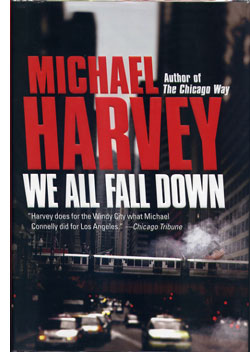 |
 |

Michael Harvey
We All Fall Down
Reviewed by: Rick Kleffel © 2011
Alfred A. Knopf / Random House
US Hardcover First Edition
ISBN 978-0-307-27251-5
Publication Date: 07-12-2011
308 pages; $24.95
Date Reviewed: 08-21-2011
Index:
Mystery
General Fiction
Science Fiction
The noir detective as we know him is a creation of the twentieth century. While there are many spins on this character and the stories that unfold, neither the writers nor the readers seem anxious to acknowledge that we left that century behind over a decade ago. Writers in the science fiction genre have taken this character and genre into the future. John Courtenay-Grimwood's Arabesk series and George Alec Effinger's Maurid Audran novels are good examples of how this can be done.
Michael Harvey's 'The Third Rail' hinted at that Harvey might take his PI, Michael Kelly and the private eye genre into this century, and 'We All Fall Down' makes good on that promise. Treading a very difficult terrain with grace, economy and the same supple strength that made his first three novels outstanding reading experiences, 'We All Fall Down' acknowledges that we live in a very different world, where individuals can make choices with catastrophic consequences for a city, and even a nation. Harvey keeps Michael Kelly's feet on the gritty streets of Chicago even as he writes about the reality of bioinformatics and the implications of "black biology."
Harvey always handles his plots deftly and 'We All Fall Down' is no exception. Readers are advised to read 'The Third Rail,' if not all three previous books beforehand. They're well worth your time. That said, you can jump in here and find that Harvey excels at putting readers quickly into the action, then propelling his characters through a grittily-evoked Chicago cityscape. 'We All Fall Down' begins with what appears to be a false alarm. When an experimental anthrax detector in a subway tunnel registers positive, all the signs suggest that there will be nothing to worry about. But nobody's taking any chances, and Michael Kelly's personal angle on the case makes sure that he's involved.
Harvey does a nice job here of introducing new characters and bring back his regulars. Vincent Rodriguez now has a paramour, and Hizzonor the Mayor is always a delight, particularly here, where he must confront his own foes in the form of Homeland Security operatives who will happily use him and his city for their own agenda in much the same manner he uses Kelly. Venture capital scientists and startup firms able to build formidable labs in major American City offer Harvey the opportunity to create some very nicely nuanced damaged damsels. Kelly's personal life is a mess, but it's the kind of mess that makes sense in the aftermath of 9/11.
Harvey sets himself a pretty difficult goal in 'We All Fall Down,' because he's got to introduce a heretofore unthinkable crime into his PI plotline. He distinguishes himself nicely by virtue of exploring a realistically evoked new science with damaged characters. He knows how to use the PI storylines to explore the world of bio-terror and its counterparts without dumping large blocks of exposition on the reader. He uses some of the tropes of both science fiction and the thriller genres in a more realistic manner but they're firmly embedded in crime fiction that involves drugs, gangs and inner city woes.
Through all this, Harvey keeps the focus close and the perspective grounded. There are of course bigger implications here, but readers are going to worry as much about Kelly and his friends as they are about the bigger implications of black biology. For readers, ultimately, the most important implications are for the PI genre itself. Michael Harvey has brought all the traditions of the twentieth-century PI into a twenty-first century story. We're barely ten years in. 'We All Fall Down' suggests it's going to be a tough journey. The fact that Michael Kelly can survive doesn't necessarily imply that we can.
|
 |
|
|
 |
| |
Review Archive
All Reviews alphabetized by author.
General Fiction
Non-Genre, general fiction and literature.
Horror
Supernatural fiction, supernatural horror and non-supernatural horror.
Science Fiction
Science fiction, science fantasy, speculative fiction, alternate history.
Fantasy
Fantasy, surrealism and magic realism.
Mystery
Crime, thrillers, mystery, suspense.
Non-Fiction
Non-Fiction, True Crime, Forteana, Reference.
Poetry
|
|
 |
|




